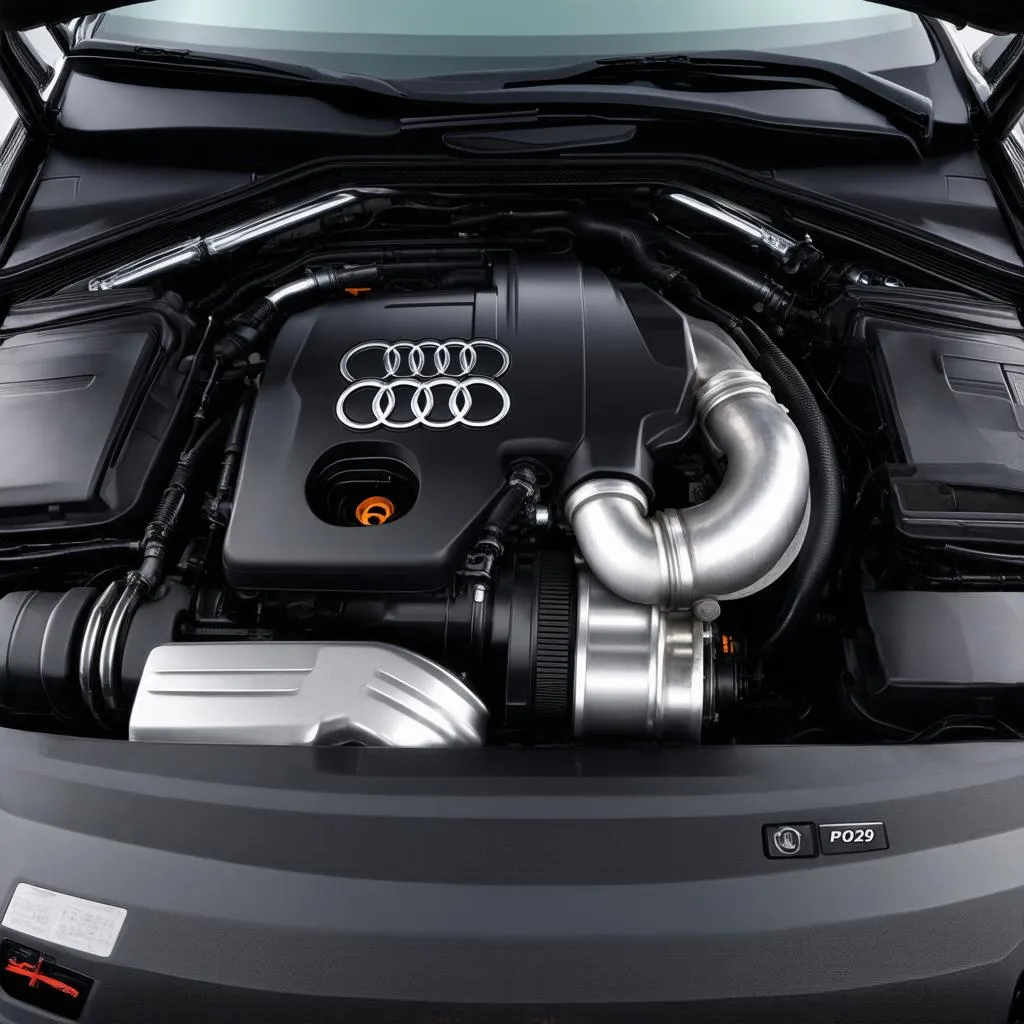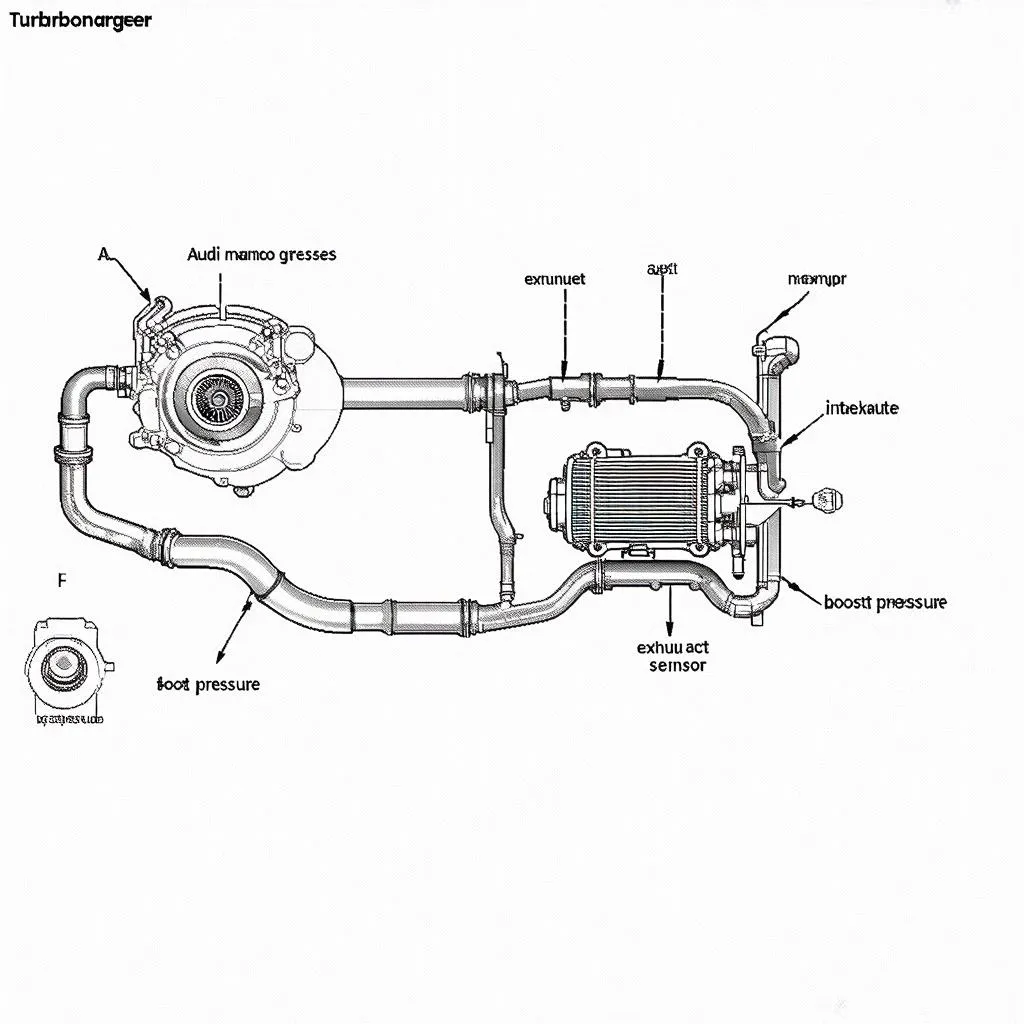Have you ever wondered what it feels like to have your car’s engine suddenly lose power? Imagine cruising down the highway, accelerating smoothly, only to find your Audi struggling to accelerate. The dreaded “check engine” light flashes on, and the display reads “P0299”. It’s a moment of panic, a feeling of uncertainty, and a sense of dread as you question what’s going on with your beloved vehicle.
The Meaning Behind Audi OBD Code P0299
The OBD code P0299 is a cryptic message, a code that signals a deeper issue within your Audi’s engine. It stands for “Turbocharger/Supercharger A Underboost Condition”. In simpler terms, it indicates that the turbocharger, the magical component that utilizes exhaust gases to increase engine power, isn’t functioning optimally. It’s like your car’s secret weapon has gone AWOL.
From a mechanical perspective:
- The turbocharger, a critical part of your engine’s breathing system, uses exhaust gases to spin a turbine, forcing air into the engine at higher pressure. This increases power and torque.
- The code P0299 indicates that the turbocharger is not producing enough boost pressure, leading to a loss of power and performance.
From a driver’s perspective:
- You might experience a noticeable lag in acceleration, a sluggish feeling as if your car is holding back.
- The “check engine” light may illuminate on the dashboard, accompanied by a message related to the turbocharger or boost pressure.
From a technical perspective:
- The ECU (Engine Control Unit), the brain of your car, monitors various parameters, including boost pressure.
- When the ECU detects a significant deviation from the expected boost pressure, it triggers the P0299 code, alerting you to a potential issue.
Understanding The Roots of The Problem
Now that we understand what P0299 means, let’s explore some common causes of this error code:
- Defective Boost Pressure Sensor: The boost pressure sensor, a tiny but critical component, is responsible for measuring the pressure generated by the turbocharger. A faulty sensor can send inaccurate readings to the ECU, leading to the P0299 code.
- Leaking Turbocharger System: A leak in the turbocharger system, such as a cracked hose, a loose clamp, or a damaged intercooler, can lead to a loss of boost pressure, triggering the code.
- Clogged Intake System: A clogged intake system, including the air filter, can restrict airflow to the engine, reducing boost pressure and causing the code to appear.
- Faulty Turbocharger: The turbocharger itself could be failing, experiencing issues with its impeller, seals, or bearings, leading to a reduction in boost pressure.
P0299 – A Sign of Something Deeper
Think of the P0299 code as a warning sign, an indication that something is amiss within your engine’s intricate system. It’s like a whisper from your car, urging you to pay attention and address the underlying issue. While some causes, such as a clogged intake system, might be relatively simple to fix, others, such as a faulty turbocharger, require more specialized attention.
What to Do If You See P0299
If you encounter the P0299 code, it’s important to take action promptly:
- Don’t ignore it: The P0299 code doesn’t just magically disappear. The issue will likely worsen if left unchecked, potentially leading to more severe engine problems.
- Get it diagnosed: Take your Audi to a trusted mechanic or diagnostics specialist. They can use a scanner to read the code, pinpoint the cause, and provide the most appropriate repair solution.
- Don’t Panic: Remember, not all P0299 codes require immediate and expensive fixes. While a faulty turbocharger could be costly, a simple clogged intake filter is a quick and inexpensive fix.
P0299: An Audi Owners’ Guide
“P0299: The Turbocharger Underboost Enigma” – Dr. Max Weber, Automotive Engineering Guru.
There are some key considerations for Audi owners who encounter the P0299 code:
- Audi’s reputation for high performance: Audi is known for its sporty vehicles with powerful engines. A turbocharger issue can dramatically impact the driving experience and potentially damage your car’s reputation.
- Audi’s reputation for advanced technology: Audi vehicles are equipped with sophisticated engine management systems. A P0299 code might require specialized tools and knowledge to diagnose and repair effectively.
Finding The Solution: Your Audi’s P0299 Journey
“The Art of Troubleshooting: A Holistic Approach to Car Maintenance” – Dr. Emily Jones, Automotive Diagnostics Expert.
Troubleshooting the P0299 code requires a systematic approach. Here are some steps to consider:
- Review the code: Start by understanding the code itself and its potential causes. Consider the context of the issue: has the code appeared recently, or is it a recurring problem?
- Visual Inspection: Inspect the turbocharger system for visible signs of damage, leaks, or blockages.
- Boost Pressure Test: If the code persists, use a boost pressure gauge to measure the actual boost pressure and compare it to the manufacturer’s specifications.
- Data Logging: Use a diagnostic tool to record sensor readings and engine parameters. This can help pinpoint the root cause of the underboost condition.
P0299: From The Inside Out
“Automotive Diagnostics: Bridging The Gap Between Technology and Tradition” – Dr. Joseph Green, Automotive Technology Innovator.
The P0299 code is a reflection of the complex interplay between technology and mechanics. Understanding the inner workings of the turbocharger system, the interplay of sensors, and the ECU’s role in monitoring boost pressure is crucial for effectively diagnosing and resolving this issue.
P0299 – A Guide to Audi Turbocharger Care
“Turbocharging: Harnessing The Power of Exhaust Gases” – Dr. David Lee, Turbocharger Engineering Expert.
Here are some tips for maintaining your Audi’s turbocharger system and minimizing the risk of encountering the P0299 code:
- Regular maintenance: Regular oil changes and air filter replacements are crucial for maintaining the turbocharger system’s health.
- Avoid harsh driving: Avoid sudden acceleration and hard braking, which can put undue stress on the turbocharger.
- Let the engine cool down: Allow the engine to idle for a minute or two after a hard drive to allow the turbocharger to cool down properly.
P0299 – FAQs
What are the symptoms of a turbocharger underboost condition?
- Loss of power: The engine may feel sluggish, especially during acceleration.
- Lag in acceleration: You may experience a noticeable delay in response to the accelerator pedal.
- Check engine light: The “check engine” light may illuminate on the dashboard.
What are the most common causes of P0299 in Audi vehicles?
- Boost pressure sensor failure: A faulty boost pressure sensor can send inaccurate readings to the ECU, triggering the code.
- Leaking turbocharger system: Cracks, holes, or loose clamps in the turbocharger system can cause leaks and reduce boost pressure.
- Clogged intake system: A clogged air filter can restrict airflow and reduce boost pressure.
How can I prevent the P0299 code from occurring in my Audi?
- Regular maintenance: Follow the manufacturer’s recommended maintenance schedule for oil changes, air filter replacements, and inspections.
- Avoid harsh driving: Avoid aggressive acceleration and hard braking, which can put stress on the turbocharger.
- Allow the engine to cool down: Let the engine idle for a minute or two after a hard drive to allow the turbocharger to cool down properly.
P0299 – A Final Thought
The P0299 code can be a source of concern, but with a clear understanding of its meaning, common causes, and troubleshooting tips, you can confidently address the issue and restore your Audi’s performance. Remember, proactive maintenance, careful driving habits, and prompt diagnosis are key to keeping your Audi running smoothly.
 Audi P0299 Turbocharger Error
Audi P0299 Turbocharger Error
 Audi Turbocharger System
Audi Turbocharger System
If you encounter the P0299 code and need professional assistance, feel free to reach out to our team of automotive experts at techcarusa.com. We’re available 24/7 to help you diagnose and resolve any issues with your Audi. You can also explore our website for more detailed articles on Audi OBD codes, turbocharger care, and other automotive topics.
Contact Us:
Whatsapp: +84767531508
We’re here to help you keep your Audi running at peak performance.
